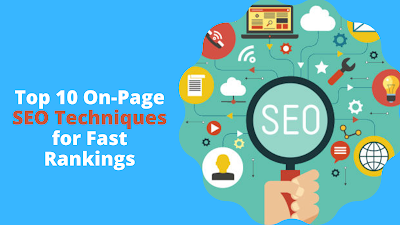Top 10 On-Page SEO Techniques for Fast Rankings
In the ever-evolving landscape of search engine optimization (SEO), on-page optimization plays a crucial role in achieving fast rankings and improving your website's visibility. By optimizing various on-page elements, you can enhance your website's relevance and authority, leading to higher search engine rankings. In this blog post, we will explore the top 10 on-page SEO techniques that can help you achieve faster rankings for your website.
Keyword Research and Optimization:
Keyword research is the foundation of on-page SEO. Identify relevant keywords and phrases that align with your content and target audience's search intent. Optimize your website's meta tags, headings, content, and URLs by strategically incorporating these keywords while maintaining a natural flow.
High-Quality and Engaging Content:
Creating high-quality, informative, and engaging content is paramount. Search engines prioritize websites that provide value to users. Develop unique and comprehensive content that answers user queries, includes relevant keywords, and encourages users to spend more time on your website.
Optimized Page Titles and Meta Descriptions:
Craft compelling and keyword-rich page titles and meta descriptions. These elements appear in search engine results and influence click-through rates. Keep your titles under 60 characters and meta descriptions under 160 characters to ensure they display properly in search results.
URL Structure:
Organize your website's URLs in a logical and SEO-friendly manner. Use descriptive words and separate them with hyphens (-) for clarity. Avoid using generic URLs with numbers or special characters, as they provide little context to search engines or users.
Header Tags:
Properly structure your content using header tags (H1, H2, H3, etc.). This helps search engines understand the hierarchy and relevance of your content. Include relevant keywords in your headings to optimize for both search engines and users.
Image Optimization:
Optimize your images for faster page loading and improved SEO. Compress images without sacrificing quality, add descriptive alt text, and use relevant filenames. These practices not only enhance user experience but also help search engines understand the content of your images.
Internal Linking:
Implement a strong internal linking strategy to guide users and search engines through your website. Link relevant pages together using descriptive anchor text. This helps search engines establish connections between different pages, improve crawl ability, and distribute link equity.
Mobile Optimization:
Given the rise in mobile usage, optimizing your website for mobile devices is essential. Ensure your website is mobile-friendly, loads quickly, and provides a seamless user experience across different screen sizes. Mobile-optimized websites tend to rank higher in search results.
Page Speed Optimization:
Website speed is a critical ranking factor. Optimize your website's loading time by minimizing code, compressing images, leveraging browser caching, and utilizing content delivery networks (CDNs). Faster-loading websites offer better user experiences and are favored by search engines.
User Signals and Engagement:
Engage your audience by focusing on user signals such as bounce rate, time spent on a page, and social sharing. Create user-friendly navigation, readable content, and clear calls to action to encourage visitors to explore your website further. User engagement signals can positively impact your rankings.
- With SEO Digitz, you can achieve organic Google rankings on Google search engines exclusively for business owners who are dreaming of achieving organic Google rankings. We offer specific SEO services in Bangalore to clients looking for organic rankings but are unable to rank even after engaging the Top SEO company in Bangalore.



Comments
Post a Comment